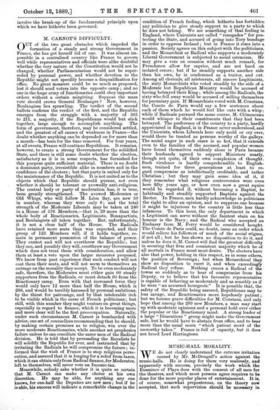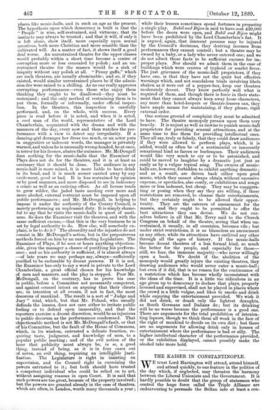MUSIC-HALL MORALITY.
WE do not clearly understand the extreme irritation caused by Mr. McDougall's action against the music-halls He is doing for them very zealously, and apparently with success, precisely the work which the Examiner of Plays does with the consent of all men for the theatres, and which most persons agree requires to be done for the more popular places of entertainment. It is, of course, somewhat preposterous, on the theory now accepted, that such supervision should be necessary in places like music-halls, and in such an age as the present. The hypothesis upon which democracy is built is that the " People " is wise, self-restrained, and virtuous ; that its instincts may always be trusted ; and that it will, if only it is left alone, show itself, more especially upon sexual questions, both more Christian and more sensible than the cultivated will. As a matter of fact, it shows itself a good deal worse. An unrestrained theatre for the upper classes would probably within a short time become a centre of corruption more or less concealed by polish ; and an un- restrained theatre for the masses would be a sink of iniquity without any polish at all. "Penny gaffs," which are such theatres, are usually abominable ; and so, if they existed, would similar unrestrained places be if the admis- sion-fee were raised to a shilling. As no one really approves corrupting performances—even those who enjoy them thinking they ought to be disallowed—they must be restrained ; and the only method of restraining them is to put them, formally or informally, under official inspec- tion. In the theatres, this inspection is carefully performed, and, on the whole, with success. Every piece is read before it is acted, and when it is acted, a• cool man of the world, representative of the Lord Chamberlain, acquainted with the drama and with the manners of the day, every now and then watches the per- formance with a view to detect any irregularity. If a dancing-girl deranges her dress too much, or an actor puts in, suggestive or indecent words, the manager is privately warned, and unless he is unusually wrong-headed, he at once, in terror for his licence, abates the nuisance. Mr. McDougall does nothing for the music-halls that the Examiner of Plays does not do for the theatres, and it is at least as necessary that it should be done. The audience in any music-hall is more mixed, it is more liable to have drink in its head, and it is much sooner carried away by any excitement, good or bad. It is less restrained by opinion or by good manners, and more disposed to see in indecency a comic as well as an enticing effect. As all license tends to grow wilder, the jaded taste needing ever more and more alcohol, external restraint must be imposed upon all public performances ; and Mr. McDougall, in helping to impose it under the authority of the County Council, is merely- performing an unpleasant duty. It is simply shame- ful to say that he visits the music-halls in quest of nasti- ness. So does the Examiner visit the theatres, and with the same sufficient excuse,—that this is the very business he is set by legal authority to do. How else, will somebody ex- plain, is he to do it ? The absurdity and the injustice do not consist in Mr. McDougall's action, but in the preposterous methods forced on him by an unrefiecting Legislature. The Examiner of Plays, if he sees or hears anything objection- able, gives the manager a chance of purifying his perform- ance; and as his authority is sufficient, it is almost always —of late years we may perhaps say, always—sufficiently purified to be endurable by decent persons. If it is not, the Examiner has only to say a word in private to the Lord Chamberlain, a great official chosen for his knowledge of men and manners, and the play is stopped. Poor Mr. McDougall, on the contrary, has to prove his ease in public, before a Committee not necessarily competent, and against counsel intent on arguing that their clients are in intention at all events, if not in fact, the most decorous of mankind. The result is a sort of "Judge and Jury" trial, which, but that Mr. Poland, who usually defends the lessees, does not care either to irritate public feeling or to defend open immorality, and that the reporters exercise a decent discretion, would be as injurious to public decorum as the performances condemned. That objectionable method is not Mr. McDougalPs fault, or that of his Committee, but the fault of the House of Commons, which, in its wisdom, entrusted a delicate function, re- quiring taste, judgment, and knowledge of men, to a popular public meeting ; and of the evil notion of the hour that publicity must always be, in se, a good thing, instead of being, as it is in four cases out of. seven, an evil thing, requiring an intelligible justi- fication. The Legislature is right in insisting on supervision, and the Council right in exercising the powers entrusted to it ; but both should have trusted a competent individual who could be relied on to act, without assigning reasons in open Court. It is said that such powers are too great, because of the property involved; but,the powers are granted already in the case of theatres, which are often, in London, worth many thousands a year ; while their lessees sometimes spend fortunes in preparing a single play. Babil and Bijou is said to have cost £20,000 before the doors were open, and Babil and Bijou might have been prohibited by the Lord Chamberlain's fiat. It is argued, again, that innocent persons may be injured by the Council's decisions, they deriving incomes from performances they cannot control ; but a theatre may be owned by a baby, or a lady who never entered one; and we do not admit those facts to be sufficient excuses for im- proper plays. Nor should we admit them in the case of buildings which were centres of typhoid or scarlet fever. The just grievance of the music-hall proprietors, if they have one, is that they have not the quiet but effective warnings which, and not scandalous trials involving libels shaken as it were out of a pepper-box, keep our theatres moderately decent. They know perfectly well what is required of them, and though there is force in their state- ment that they cannot always keep away loose characters, any more than hotel-keepers or theatre-lessees can, they have ample means for maintaining, if they please, rigid external order.
One serious ground of complaint they must be admitted to have. The theatre monopoly presses upon them very heavily. It is unjust as well as unwise to punish music-hall proprietors for providing sensual attractions, and at the same time to fine them for providing intellectual ones. They all say, truly or falsely, that they could draw audiences if they were allowed to perform plays, which, it is added, would as often be of a sentimental or innocently sensational kind as farces or burlesques. Their audiences would like very much to cry or to be astonished, and could be moved to laughter by a dramatic jest just as easily as by a vulgar topical song. The owners of music- halls are, however, forbidden to exhibit anything dramatic ; and as a result, are driven back either upon good music, which they cannot always obtain without excessive expense, or spectacles, also costly, or exhibitions and songs more or less indecent, but cheap. They may be exaggera- ting or posing when they say they are willing, if these restrictions are removed, to cleanse their entertainments, but they certainly ought to be allowed their oppor- tnnity. They are the caterers of amusement for the masses, and they ought to be permitted to offer the best attractions they can devise. We do not our- selves believe in all that Mr. Terry said to the Church Congress on behalf of the theatre, seeing that when un- restrained, it usually, in all countries, becomes vile ; but under strict restrictions, it is as blameless an amusement as any other, while its attractions have outlived any other through all the ages of history. If the music-halls become decent theatres of a less formal kind, so much the better for the people, and especially for those— still, we fear, the immense majority—who never willingly open a book. We doubt if the abolition of the monopoly would greatly injure the existing theatres, they drawing audiences who would never enter a music-hall ; but even if it did, that is no reason for the continuance of a restriction which has become wholly inconsistent with the ideas of the time. It is a little too ridiculous in an age given up to democracy to declare that plays, properly licensed and supervised, shall not be played in places where the crowd is a little vulgar, and likes to smoke and drink while enjoying the entertainment provided. We wish it did not drink, or drank only the lightest draughts, as South Germans and Italians do ; but its drinking will be no worse because the performance is a good one. There are arguments for the total prohibition of intoxica- ting liquors, though we think them all weak in the face of the right of mankind to decide on its own diet ; but there are no arguments for allowing drink only in houses of entertainment where the performance is bad or silly. The higher intellectual character of the performance provided, or the exhibition displayed, cannot possibly make the alcohol take more hold.



















































 Previous page
Previous page